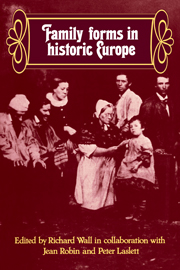Book contents
- Frontmatter
- Contents
- List of contributors
- Preface
- 1 Introduction
- 2 Two kinds of pre-industrial household formation system
- 3 ‘A large family: the peasant's greatest wealth’: serf households in Mishino, Russia, 1814–1858
- 4 The peasant family as an economic unit in the Polish feudal economy of the eighteenth century
- 5 The familial contexts of early childhood in Baltic serf society
- 6 Estonian households in the seventeenth and eighteenth centuries
- 7 Family and familia in early-medieval Bavaria
- 8 The property and kin relationships of retired farmers in northern and central Europe
- 9 Pre-industrial household structure in Hungary
- 10 The reconstruction of the family life course: theoretical problems and empirical results
- 11 The changing household: Austrian household structure from the seventeenth to the early twentieth century
- 12 Does owning real property influence the form of the household? An example from rural West Flanders
- 13 The evolving household: the case of Lampernisse, West Flanders
- 14 The composition of households in a population of 6 men to 10 women: south-east Bruges in 1814
- 15 The importance of women in an urban environment: the example of the Rheims household at the beginning of the Industrial Revolution
- 16 The household: demographic and economic change in England, 1650–1970
- 17 Family and household as work group and kin group: areas of traditional Europe compared
- References
- Index
17 - Family and household as work group and kin group: areas of traditional Europe compared
Published online by Cambridge University Press: 05 November 2011
- Frontmatter
- Contents
- List of contributors
- Preface
- 1 Introduction
- 2 Two kinds of pre-industrial household formation system
- 3 ‘A large family: the peasant's greatest wealth’: serf households in Mishino, Russia, 1814–1858
- 4 The peasant family as an economic unit in the Polish feudal economy of the eighteenth century
- 5 The familial contexts of early childhood in Baltic serf society
- 6 Estonian households in the seventeenth and eighteenth centuries
- 7 Family and familia in early-medieval Bavaria
- 8 The property and kin relationships of retired farmers in northern and central Europe
- 9 Pre-industrial household structure in Hungary
- 10 The reconstruction of the family life course: theoretical problems and empirical results
- 11 The changing household: Austrian household structure from the seventeenth to the early twentieth century
- 12 Does owning real property influence the form of the household? An example from rural West Flanders
- 13 The evolving household: the case of Lampernisse, West Flanders
- 14 The composition of households in a population of 6 men to 10 women: south-east Bruges in 1814
- 15 The importance of women in an urban environment: the example of the Rheims household at the beginning of the Industrial Revolution
- 16 The household: demographic and economic change in England, 1650–1970
- 17 Family and household as work group and kin group: areas of traditional Europe compared
- References
- Index
Summary
In this final chapter we find ourselves returning to the issues raised in the introduction by Richard Wall and taken up by several of our contributors, especially by John Hajnal in chapter 2. If we are to compare family and household as work group and kin group among areas of traditional Europe, we shall have to lay down exactly what it is which is being compared. This means reopening the problem of the definition of the household, and the extent to which it is justifiable to suppose that it is best regarded, as we shall regard it, as a residential group. The resemblances, and the slight differences, between the view we shall take and that of earlier chapters should become evident as we proceed.
From residence we shall go on to the question of whether there were distinguishable areas of traditional Europe which can be contrasted with each other. An hypothesis will be put forward on this matter: that it is possible, and for our purposes useful, to distinguish four sets of tendencies in traditional Europe as to the composition of the family household in relation to work and to kinship, tendencies which can be tentatively labelled ‘west and north-west’, ‘middle’, ‘Mediterranean’, and ‘east’. After this we shall proceed to our subject proper and marshal such evidence as we have space to consider on working relationships within families and households alongside reproductive and kin relationships. We shall end by facing the question of historical development.
- Type
- Chapter
- Information
- Family Forms in Historic Europe , pp. 513 - 564Publisher: Cambridge University PressPrint publication year: 1983
- 136
- Cited by



